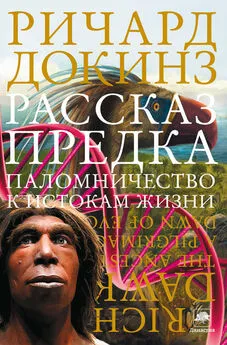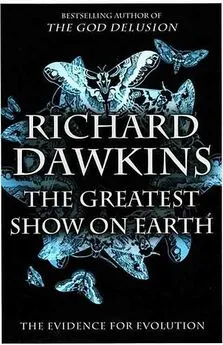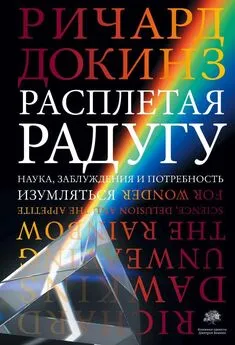Ричард Докинз - Рассказ предка. Паломничество к истокам жизни
- Название:Рассказ предка. Паломничество к истокам жизни
- Автор:
- Жанр:
- Издательство:Литагент «Corpus»47fd8022-5359-11e3-9f30-0025905a0812
- Год:2015
- Город:Москва
- ISBN:978-5-17-084589-7
- Рейтинг:
- Избранное:Добавить в избранное
-
Отзывы:
-
Ваша оценка:
Ричард Докинз - Рассказ предка. Паломничество к истокам жизни краткое содержание
Известный ученый-натуралист и популяризатор науки приглашает в грандиозное путешествие длиной в четыре миллиарда лет – к истокам жизни на Земле. По мере погружения в прошлое к нам, людям, присоединятся другие “пилигримы”, ищущие собственных прародителей. И тогда выяснится, что у нас общая история – и предки – не только с “сестрой цикадой” и “братом фазаном”, но и с растениями, грибами и бактериями, – со всеми организмами на планете.
Рассказ предка. Паломничество к истокам жизни - читать онлайн бесплатно ознакомительный отрывок
Интервал:
Закладка:
Radiation of extant marsupials after the K / T boundary: Evidence from complete mitochondrial genomes // Journal of Molecular Evolution 57 (2003): S3-S12.
[213] Norman, D. Dinosaur! Boxtree, London, 1991.
[214] Nozake, H., Matsuzaki, M., Takahara, M., et al. The phylogenetic position of red algae revealed by multiple nuclear genes from mitochondria-containing eukaryotes and an alternative hypothesis on the origin of plastids // Journal of Molecular Evolution 56 (2003): 485–497.
[215] ОНТА, T. The nearly neutral theory of molecular evolution // Annual Review of Ecology and Systematics 23 (1992): 263–286.
[216] Oparin, A. I. The Origin of Life. Macmillan, New York, 1938.
[217] ORGEL, L. E. The origin of life – a review of facts and speculations // Trends in Biochemical Sciences 23 (1998): 491–495.
[218] PAGEL, M. & W. BODMER A naked ape would have fewer parasites // Proceedings of the Royal Society of London: Biological Sciences (Suppl.) 270 (2003): S117-S119.
[219] PANCHEN, A. L. Etienne Geoffroy St.-Hilaire: Father of “evo-devo”? // Evolution and Development 3 (2001): 41–46.
[220] PARKER, A. In the Blink of an Eye: The Cause of the Most Dramatic Event in the History of Life. Free Press, London, 2003.
[221] Partridge, T. C., Granger, D. E., Caffee, M. W. &
R.J. CLARKE Lower Pliocene hominid remains from Sterkfontein // Science 300 (2003): 607–612.
[222] Penfield, W. & T. Rasmussen The Cerebral Cortex of Man: A Clinical Study of Localization of Function. Macmillan, New York, 1950.
[223] PERDECK, A. C. The isolating value of specific song patterns in two sibling species of grasshoppers // Behaviour 12 (1957): 1-75.
[224] PETERSON, K. J. & D.J. Eernisse Animalphylogeny and the ancestry of bilaterians: Inferences from morphology and 18S rDNA gene sequences // Evolution and Development 3 (2001): 170–205.
[225] Pettigrew, J. D., Manger, P R. & S. L. B. Fine The sensory world of the platypus // Philosophical Transactions of the Royal Society of London: Biological Sciences 353 (1998): 1199–1210.
[226] PINKER, S. The Language Instinct: The New Science of language and Mind. Allen Lane, The Penguin Press, London, 1994.
[227] Pinker, S. How the Mind Works. Norton, New York, 1997.
[228] Pough, F. H., Andrews, R. M., Cadle, J. E. & M. Crump Herpetology. 2nd ed. Prentice Hall, Upper Saddle River, N. J., 2001.
[229] PULLMAN, P Dark Materials Trilogy. Scholastic Press, London, 2001.
[230] PURVIS, A. A composite estimate of primate phylogeny // Philosophical Transactions of the Royal Society: Biological Sciences 348 (1995): 405–421.
[231] Ragan, M. A., Goggin, C. L, Cawthorn, R. J., et al.
A novel clade of protistan parasites near the animal-fungal divergence // Proceedings of the National Academy of Sciences of the USA 93 (1996): 11907-11912.
[232] Reader, J. Man on Earth. Collins, London, 1988.
[233] Reader, J. Africa: A Biography of the Continent. Penguin, London, 1998.
[234] Rebek, J. Synthetic self-replicating molecules // Scientific American 271 (l994): 48–55.
[235] Rees, M. Just Six Numbers. Science Masters, Weidenfeld & Nicolson, London, 1999.
[236] Reno, P L., Meindl, R. S., McCollum, M. A. &
C. O. Lovejoy Sexual dimorphism in Australopithecus afarensis was
similar to that of modern humans // Proceedings of the National Academy of Sciences of the USA 100 (2003): 9404–9409.
[237] Richardson, M. K. & G. Keuck Haeckel’s ABC of evolution and development // Biological Reviews 77 (2002): 495–528.
[238] Richmond, B. G., Begun, D. R. & D. S. Strait Origin of human bipedalism: The knuckle-walking hypothesis revisited // Yearbook of Physical Anthropology 44 (2001): 70-105.
[239] RIDLEY, Mark The Explanation of Organic Diversity – The Comparative Method and Adaptations for Mating. Clarendon Press – Oxford University Press, Oxford, 1983.
[240] RIDLEY, Mark Embryology and classical zoology in Great Britain / In: A History of Embryology: The Eighth Symposium of the British Society for Developmental Biology. HARDER, T. J., WlTKOWSKI, J. & С. C. Wylie, eds. Cambridge University Press, Cambridge, 1986. Pp. 35–67.
[241] RIDLEY, Mark Mendel’s Demon: Gene Justice and the Complexity of Life. Weidenfeld & Nicolson, London, 2000.
[242] RIDLEY, Matt The Red Queen: Sex and the Evolution of Human Nature. Viking, London, 1993.
[243] RIDLEY, Matt Nature Via Nurture: Genes, Experience and What Makes Us Human. Fourth Estate, London, 2003.
[244] Rodriguez-Trelles, F., Tarrio, R. & F.J. Ayala A methodological bias toward overestimation of molecular evolutionary time scales // Proceedings of the National Academy of Sciences of the USA 99 (2002): 8112–8115.
[245] ROKAS, A. & P. W H. HOLLAND Rare genomic changes as a tool for phylogenetics // Trends in Ecology and Evolution 15 (2000): 454–459.
[246] ROOS, C. & T. GEISSMANN Molecular phylogeny of the major hylo-batid divisions // Molecular Phylogenetics and Evolution 19 (2001):
486-494.
[247] Ruiz-Trillo, I., Paps, J., Loukota, M., et al. A phylogenetic analysis of myosin heavy chain type II sequences corroborates that Acoela and Nemertodermatida are basal bilaterians // Proceedings of the National Academy of Sciences of the USA 99 (2002): 11246-11251.
[248] RUPPERT, E. E. & R. D. BARNES Invertebrate Zoology. 6th ed. Saunders College Publishing, Fort Worth, 1994.
[249] Sacks, о. The Island of the Colour-blind and Cycad Island. Picador, London, 1996.
[250] Saffhill, R., Schneider-Bernloer, H., Orgel, L. E. &
S. SPIEGELMAN In vitro selection of bacteriophage Q ribonucleic acid variants resistant to ethidium bromide // Journal of Molecular Biology 5і (l970): 531–539.
[251] SANCHEZ-VlLLAGRA, M. R. The phylogenetic relationships of ar-gyrolagid marsupials // Zoological Journal of the Linnean Society 131 (2001): 481–496.
[252] Sansom, I. J., Smith, M. M. & M. P Smith The Ordovician radiation of vertebrates / In: Major Events in Early Vertebrate Evolution. Ahlberg, P E., ed. Ch. 10. Taylor and Francis, London, 2001.
[253] SCHLUTER, D. The Ecology of Adaptive Radiation. Oxford University Press, Oxford, 2000.
[254] Schmitz, J., Ohme, M. & H. Zischler SINE insertions in cla-distic analyses and the phylogenetic affiliations of Tarsius bancanus to other primates // Genetics 157 (2001): 777–784.
[255] SCHOPF, J. W. Cradle of Life – The Discovery of Earth’s Earliest Fossils . Princeton University Press, Princeton, 1999.
[256] Schussler, D., Schwarzott, C. & A. Walker A new phylum, the Glomeromycota: Phylogeny and evolution // Mycological Research 105 (2001): 1413–1421.
[257] SCOTESE, C. R. Atlas of Earth History, vol. 1, Palaeography. PALEO-MAP project, Arlington, Texas, 2001.
[258] SEEHAUSEN, O. & J. J. M. VAN ALPHEN The effect of male coloration on female mate choice in closely related Lake Victoria cichlids (Haplochromis nyererei complex) // Behavioral Ecology and Sociobiology 42 (1998): 1–8.
[259] Senut, B., Pickford, M., Gommery, D., ЕТ AL. First hominid from the Miocene (Lukeino Formation, Kenya) // Comptes Rendus de l’Academie des Sciences, Series IIA – Earth and Planetary Science 332 (2001): 137–144.
[260] SEPKOSKI, J. J. Patterns of Phanerozoic extinction: A perspective from global databases / In: Global Events and Event Stratigraphy in the Pha-nerozoic. WALLISER, О. H., ED. Springer-Verlag, Berlin, 1996. Pp. 35–51.
[261] Shapiro, в., Sibthorpe. D., Rambaut, a., et al. Flight of the dodo // Science 295 (2002): 1683.
[262] SHEETS-JOHNSTONE, M. The Roots of Thinking. Temple University Press, Philadelphia, 1990.
[263] SHIRAI, S. Phylogenetic interrelationships of neoselachians (Chon-drichthyes: Euselachii) / In: Interrelationships of Fishes. STIASSNY,
M. L. J., Parenti, L. R. & G. D. Johnsson, eds. Academic Press, San Diego, 1996. Pp. 9-34.
[264] Shu, D.-G., Luo, H.-L., Conway Morris, S., et al. Lower Cambrian vertebrates from south China // Nature 402 (1999): 42–46.
[265] SlBLEY, C. G. & B. L. Monroe Distribution and Taxonomy of Birds of the World. Yale University Press, New Haven, 1990.
[266] SIMPSON, G. G. Splendid Isolation: The Curious History of South American Mammals . Yale University Press, New Haven, 1980.
[267] Slack, J. M. W., Holland, P W. H. & C. F. Graham The zootype and thephylotypic stage // Nature 361 (1993): 490–492.
[268] SMITH, D. C. From extracellular to intracellular: The establishment of a symbiosis / In: The Cell as a Habitat. RICHMOND, M. H. &
D. C. Smith, eds. Royal Society of London, London, 1979.
[269] SMOLIN, L. The Life of the Cosmos. Weidenfeld & Nicolson, London,
1997.
[270] SOUTHWOOD, T. R. E. The Story of Life. Oxford University Press, Oxford, 2003.
[271] Springer, M. S., Murphy, W. J., Eizirik, E. & S. J. O’Brien Placental mammal diversification and the Cretaceous-Tertiary boundary // Proceedings of the National Academy of Sciences of the USA 100 (2003): 1056–1061.
[272] Springer, M. S., Westerman, M., Kavanagh, J. R., et al. The origin of the Australasian marsupial fauna and the phylogenetic affinities of the enigmatic monito del monte and marsupial mole // Proceedings of the Royal Society of London, Series B 265 (1998): 2381–2386.
[273] STEWART, С. В. & T. R. Disotell Primate evolution – in and out of Africa // Current Biology 8 (1998): R582-R588.
[274] STRINGER, C. Human evolution – out of Ethiopia // Nature 423 (2003): 692–695.
[275] Sumper, М., & R. Luce Evidence for de novo production of self-replicating and environmentally adapted RNA structures by bacteriophage QP replicase // Proceedings of the National Academy of Sciences of the USA 72 (1975): 162–166.
[276] SUTHERLAND, J. L. Protozoa from Australian termites // Quarterly Journal of Microscopic Science 76 (1933): 145–173.
[277] SWIFT, J. Poetry, A Rhapsody. 1733.
[278] Syed, T. & B. SCHIERWATER Trichoplax adhaerens: discovered as a missing link, forgotten as a hydrozoan, rediscovered as a key to metazoan evolution // Vie et Milieu 52 (2002): 177–187.
[279] Takezaki, N., Figueroa, F., Zaleska-Rutczynska, Z. &
J. KLEIN Molecular phylogeny of early vertebrates: Monophyly of the agnathans as revealed by sequences of 35 genes // Molecular Biology and Evolution 20 (2003): 287–292.
[280] TAMM, S. L. Flagellated endosymbiotic bacteria propel a eukaryotic cell // Journal of Cell Biology 94 (1982): 697–709.
[281] Tavare, S., Marshall, C. R., Will, O., et al. Using the fossil record to estimate the age of the last common ancestor of extant primates // Nature 416 (2002): 726–729.
[282] TAYLOR, C. R. & V. J. ROWNTREE Running on two or four legs: which consumes more energy? // Science 179 (1973): 186–187.
[283] Telford, M. J., Lockyer, A. E., Cartwright-Finch, C. & D. T. J. LlTTLEWOOD Combined large and small subunit ribosomal RNA phylogenies support a basal position of the acoelomorph flatworms // Proceedings of the Royal Society of London: Biological Sciences
Читать дальшеИнтервал:
Закладка:




![Ричард Докинз - Река, выходящая из Эдема [Жизнь с точки зрения дарвиниста]](/books/1063750/richard-dokinz-reka-vyhodyachaya-iz-edema-zhizn-s-to.webp)

